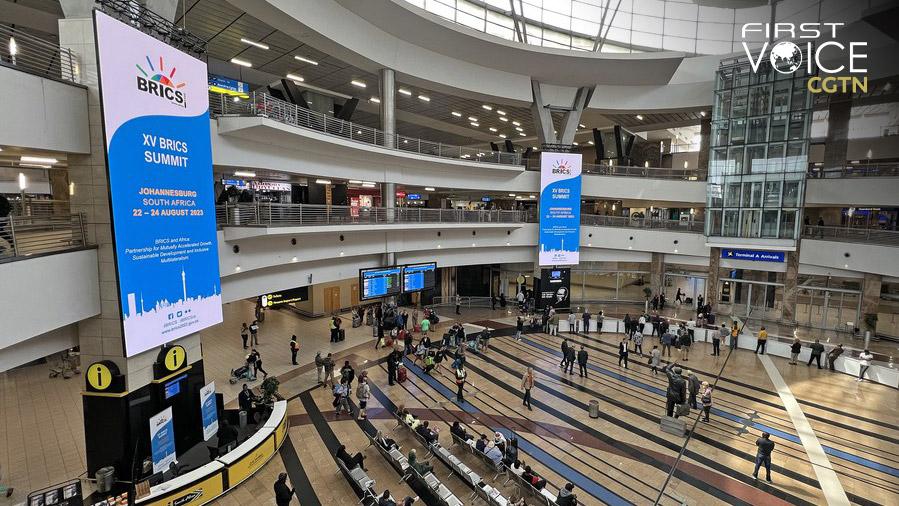
Electronic screens of the 15th BRICS Summit are seen at the O.R. Tambo International Airport in Johannesburg, South Africa, August 16, 2023. [Photo/Xinhua]
Editor's note: CGTN's First Voice provides instant commentary on breaking stories. The column clarifies emerging issues and better defines the news agenda, offering a Chinese perspective on the latest global events.
As BRICS member states were gathering in Johannesburg this week, the summit – for the third time held in Africa – has raised the anxiety level of some Westerners. In an opinion published on Wednesday, The New York Times said "China tries to increase its clout in Africa amid rivalry with the U.S.," stressing that Chinese President Xi Jinping's presence in Africa was "rallying support for an alternative to the U.S.-dominated global order."
Sadly, while global challenges are urging countries across the globe to cooperate for common development, the Cold-War mentality is still haunting the world. Certain Western countries have been obstinate in viewing the China-Africa relationship through the lens of geopolitical competition.
In contrast to former colonial powers treating the continent as a vassal that can be willfully manipulated, interactions between China and African countries are equality-based and development-oriented. Just as President Xi emphasized in his speech made at the Summit, "We do not barter away principles, succumb to external pressure, or act as vassals of others."

Chinese President Xi Jinping (2nd left) delivers an important speech at a press conference during the 15th BRICS Summit in Johannesburg, South Africa, August 24, 2023. [Photo/Xinhua]
Under the BRICS mechanism, China has stood in solidarity with Africa and other developing countries for common goals. The Chinese government has helped build more than 6,000 kilometers of railway, over 6,000 kilometers of highway, and 80-plus large power facilities in Africa. China-led infrastructural boom in Africa has turned out to be vital in boosting local employment and reviving the economy.
For instance, China-aided Husab Uranium Mine in Namibia has created 4,500 temporary jobs and 1,600 permanent jobs, while the Belo Monte substation in Angola has benefited 300,000 households and more than 2.5 million people, George Nsamba, a risk management executive in South Africa, was quoted by China Daily as saying.
Apart from infrastructural aid, the Chinese government has created a $4-billion Global Development and South-South Cooperation Fund for sustainable development in the region. At the BRICS-Africa Outreach and BRICS Plus Dialogue held on the sidelines of the BRICS Summit, President Xi has also pledged to offer satellite mapping data products, implement a Smart Customs cooperation partnership, and launch a "GDI (Global Development Initiative) for Africa's Future" with UNESCO for the continent.
Against Western accusations that China's presence in Africa is a new "colonization" and an attempt to challenge the U.S.-dominated global order, China has been viewing the continent as a partner to be supported. Just as President Xi said, "China is a friend that Africa can count on." China has always put development first. China-aid projects in the continent are not to lure regional countries into a trap but to enhance the continent's capacity for development.
In contrast, U.S.-led Western countries have been attempting to manipulate Africa for selfish gains and draw the continent into a geopolitical club under the "small yard, high fence" strategy. Mallence Bart-Williams, a Sierra Leonean-German activist, philanthropist and social entrepreneur, has straightforwardly pointed out the essence of Africa-West relationship, "The aid is not coming from the West to Africa, but from Africa to the Western world." "By systematically destabilizing the wealthiest African nations and their systems…, (and) leaving the entire world under the impression that Africa is poor and dying and merely surviving on the mercy of the West," the West ensure the free aid keeps coming, Bart-Williams said in her TED speech.
In the meantime, China has proved its sincerity in building a community of shared development with concrete actions. African people, on several occasions, have thanked Beijing for the opportunities the Chinese government has provided. Apart from Africa, developing countries have been actively taking part in China-led mechanisms. BRICS expansion – Argentina, Egypt, Ethiopia, Iran, Saudi Arabia, and the United Arab Emirates joined the mechanism on Thursday – is a typical example.
Against Western accusations, Africa and an increasing number of countries across the globe have made the right choice between development and a new Cold War.

 中文
中文



